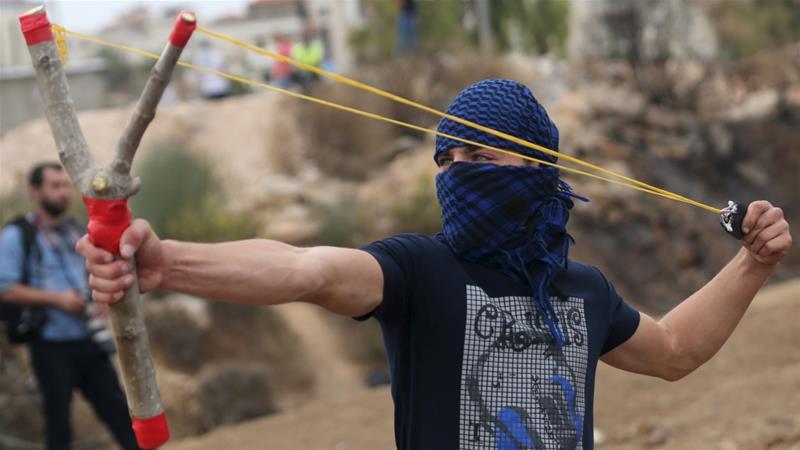Home » Middle East »
UN officials condemn arbitrary arrest of Palestinian children
UN reports at Human Rights Council in Geneva show Palestinian living conditions severely worsening over the past year.
United Nations officials condemned the continued arbitrary detention of Palestinian children by Israel saying the practice has become “systematic and widely spread”.
A series of UN reports presented at the Human Rights Council shows how the living conditions of Palestinians across the West Bank and Gaza have dramatically worsened over the past year, and how children are bearing the brunt of the Israeli occupation, said Kate Gilmore, the UN deputy high commissioner for human rights.
“The past year saw hundreds of Palestinian children detained by Israel, some without charge under administrative detention,” Gilmore said, addressing the council in Geneva on Tuesday.
“The impact of the conflict on the lives of children is entirely unacceptable. In this year alone, six children have been shot and killed in the context of protests.”
Plight of children
In November 2017, 313 Palestinian minors were imprisoned with 729 children detained in East Jerusalem alone throughout last year.
Michael Lynk, special rapporteur on the human rights situation in the occupied Palestinian territories, said on Monday the deteriorating situation for Palestinian children was particularly “disturbing”.
Under the UN’s Convention on the Rights of the Child, the incarceration of a child should be used only as a last resort.
“Yet, the deprivation of liberty of Palestinian children by Israel is institutionalised, systematic, and widely spread,” said Lynk, addressing member states.
Gilmore introduced six reports drawing from monitoring work undertaken by the Office of the High Commissioner for Human Rights (OHCHR) in the occupied Palestinian territories.
“Half a century of occupation has taken a heavy toll on the human rights of virtually every Palestinian, regardless of where in the occupied territory they reside,” she said. “The feelings of despair among Palestinians in the face of these developments cannot be overstated.”
Settlements
One of the reports described the accelerated expansion of Israel’s settlements in the West Bank and East Jerusalem. In 2017, settlement construction nearly doubled compared with previous years.
Gilmore said the UN registered an increase in the number of related legislative proposals in Israel and “an accompanying escalation in political rhetoric, suggesting there is a move towards de facto annexation of parts of the West Bank”.
A series of human rights violations by Israel, she said, created an environment that has the effect of coercing residents of East Jerusalem to leave.
“These are home demolitions and forced evictions, restricted access to services, threats of violence – including violence at the hands of settlers – restrictions on freedom of movement, and a strict residency regime for Palestinian residents of East Jerusalem,” said Gilmore.
Gaza blockade
The worsening situation in Gaza was also scrutinised in the UN reports.
“After more than a decade under blockade, the situation in Gaza has deteriorated to a point that is unbearable for its inhabitants and untenable for the future,” said Gilmore.
“The range and depth of human rights violations in this crowded strip of land is truly alarming. The vast majority of the population of two million cannot leave due to restrictions to their freedom of movement. Essential services such as those associated with health, education, water and sanitation need reliable and affordable electricity. Yet today, Gazans live with electricity cuts lasting up to 18-20 hours a day.”
According to the reports, the situation has brought the health system to the verge of collapse, with many lives lost along the way. It has made simple daily tasks – such as cooking, washing, caring for children, heating homes, and visiting relatives – a complex challenge with severe impacts on all Gazans.
“This terrible reality for Gazans is recognised by Israel, understood by the Palestinian Authority, and known to the international community,” she said.
Israel and its main allies – the US and the UK – boycotted the debate on the human rights situation in Palestine.
The US earlier slammed the UN Human Rights Council for what it called “biased” treatment of Israel.
Israel’s ambassador to the UN in Geneva, Aviva Raz Shechter, said in January “the continuous discrimination against Israel” and “unparalleled number of one-sided biased and political resolutions adopted regularly by the automatic majority of its members testifies not only to the unfair treatment of the state of Israel but to the deficiencies of the council itself and its agenda”.
The Listening Post
Israel-Palestine: The conflict and the coverage
Source: Read Full Article






